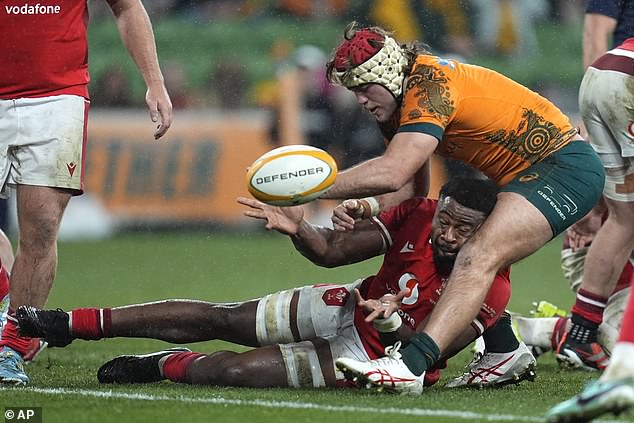- Players who have suffered multiple concussions are more prone to MND
- A University study analysed blood samples of former male professionals
- The results showed concussed players had higher levels of certain proteins
Retired rugby players who have suffered multiple concussions are more prone to developing brain illnesses such as motor neurone disease (MND), new research has found.
A Durham University study analysed blood samples of former male professionals who had suffered numerous head injuries over the course of their time on the field.
The results showed that the players had higher levels of certain proteins in their blood compared to a control group of fellow athletes who had not suffered head trauma.
It is the presence of those proteins that leads to the development of problems such as MND and early onset dementia. Durham University’s findings could have serious implications.
As it stands, more than 300 ex-rugby union players are suing the game’s governing body World Rugby, England’s Rugby Football Union and the Welsh Rugby Union for failing to take reasonable action to protect them from permanent injuries they say were caused by repetitive concussive and sub-concussive blows during their careers. A number of rugby league players are also doing likewise with their authorities.
Retired rugby players who have suffered multiple concussions are more prone to developing brain illnesses such as motor neurone disease (MND), new research has found
World Rugby is yet to officially recognise a link between head injuries and the development of specific brain diseases like MND. That’s despite the fact that a 2022 study, led by consultant neuropathologist Willie Stewart of the University of Glasgow looking at the impact of concussion on a group of former Scottish international rugby players, found that they were 15 times more likely to develop MND than the general population.
Former Scotland rugby union ace Doddie Weir and ex-rugby league star Rob Burrow have both passed away in the last two years after being diagnosed with MND.
The study analysed the blood samples of 56 male professional athletes seven years after retiring from their sport. This included 30 retired rugby players who had suffered more than five concussions in their playing career. They were compared with 26 retired rugby players without concussions and retired athletes from non-contact sports.
Senior author on the study, Professor Paul Chazot, from Durham University’s Department of Biosciences, said: ‘The long-term effects of concussions on rugby players, football players, boxers as well as retired military personnel is a major concern because of the link to neurodegenerative diseases.
‘This study gives us the beginnings of a biomarker toolbox to periodically monitor the brain health of retired contact sportspeople, particularly those with a history of concussion during their career. It will also pave the way for the introduction of the necessary interventions to minimise the development of future neurodegenerative disease. ‘We have a range of interventions currently in advanced stages of development.’
Durham University’s research does provide cause for some optimism. It shows it may be possible to measure key biomarkers on blood protein levels which predict possible future disease in athletes who have suffered multiple traumas to the head. It is hoped that might lead to earlier diagnoses and treatments.

Former Scotland rugby union ace Doddie Weir (pictured) and ex-rugby league star Rob Burrow have both passed away in the last two years after being diagnosed with MND
Alix Popham, who was not involved in the study, is a retired international rugby union player and one of those involved in legal action against the game’s authorities.
Popham was one of the first former rugby stars to launch the concussion law suit alongside England’s 2003 World Cup-winning hooker Steve Thompson and Michael Lipman after he was diagnosed with probable chronic traumatic encephalopathy (CTE) and early onset dementia in 2020.
‘This is more evidence that big changes need to happen to protect current rugby players. World Rugby need to get their heads out of the sand and in turn protect the game,’ Popham said.

